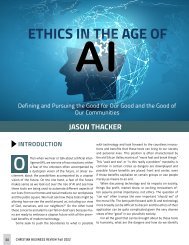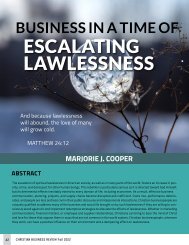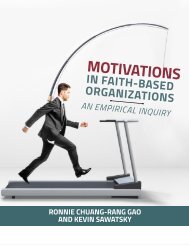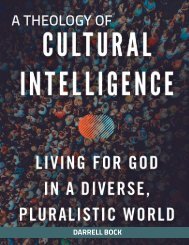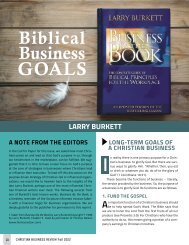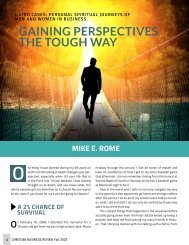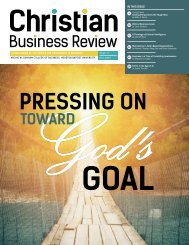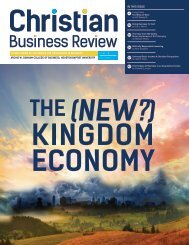Christian Business Review 2018: Kingdom Business in the Brave New World (Issue 7)
You also want an ePaper? Increase the reach of your titles
YUMPU automatically turns print PDFs into web optimized ePapers that Google loves.
ECONOMICS, PRIVACY, AND<br />
CHRISTIAN ETHICS<br />
By Steven Mc Mullen<br />
Abstract: Concerns about consumer privacy have <strong>in</strong>tensified <strong>in</strong> recent years as electronic commerce has become<br />
more common. These concerns result from economic and technological developments that encourage retail specialization.<br />
Moreover, privacy concerns can prevent markets from serv<strong>in</strong>g customers, and can contribute to a problematic<br />
consumer culture. This essay argues that a <strong>the</strong>ological concern for form<strong>in</strong>g and preserv<strong>in</strong>g relationships <strong>in</strong> commerce<br />
can guide <strong>Christian</strong> responses to privacy concerns and to <strong>the</strong> consumer culture that results. The essay concludes with<br />
some guidel<strong>in</strong>es for build<strong>in</strong>g trust around data use between firms and consumers.<br />
Introduction<br />
In recent years, concerns related to privacy and technology<br />
have grown substantially, mak<strong>in</strong>g security and<br />
consumer privacy, especially regard<strong>in</strong>g activity on<br />
<strong>the</strong> <strong>in</strong>ternet, a top priority for technology companies.<br />
There is no doubt that modern consumers have a new set<br />
of privacy-related concerns that earlier cohorts did not<br />
need to worry about. The ubiquity of personal <strong>in</strong>formation<br />
available on social networks and blogs is just <strong>the</strong> tip of <strong>the</strong><br />
iceberg. Advertisements and prices are often customized<br />
to an <strong>in</strong>dividual based on <strong>the</strong>ir brows<strong>in</strong>g history and <strong>the</strong>ir<br />
known demographic profile. <strong>New</strong> “gig-economy” <strong>in</strong>novations<br />
such as Uber and Airbnb can limit <strong>the</strong> <strong>in</strong>stitutional<br />
buffers between people engaged <strong>in</strong> commerce. 1 Accord<strong>in</strong>g<br />
to one famous study 87% of people <strong>in</strong> <strong>the</strong> U.S. are uniquely<br />
identifiable if you know only <strong>the</strong>ir name, gender, birthdate,<br />
and zip code. 2 Moreover, corporations are only start<strong>in</strong>g<br />
to take advantage of <strong>the</strong> detailed <strong>in</strong>formation <strong>the</strong>y often<br />
can collect about <strong>the</strong>ir customers’ spend<strong>in</strong>g habits, and as<br />
mach<strong>in</strong>e learn<strong>in</strong>g tools improve, firms, governments, and<br />
political organizations will <strong>in</strong>creas<strong>in</strong>gly be able to pitch<br />
sophisticated messages and offers to <strong>in</strong>dividuals on <strong>the</strong><br />
basis of <strong>the</strong>ir available data.<br />
In this essay I will argue that <strong>the</strong>se privacy concerns<br />
have economics at <strong>the</strong>ir root as much as technology. The<br />
40<br />
CHRISTIAN BUSINESS REVIEW fall <strong>2018</strong>




